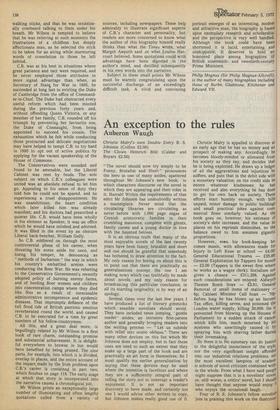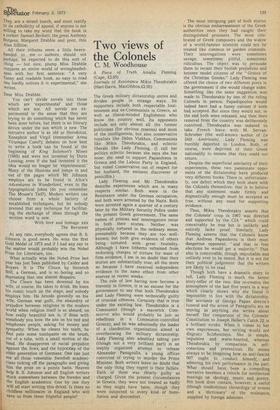An exception to the rules
Auberon Waugh
Christie Malry's own Double Entry B. S. Johnson (Collins £2.00) The Clown Heinrich Boll (Calder and Boyars £2.50) " The novel should now try simply to be Funny, Brutalist and Short" pronounces the hero in one of many asides, spattered throughout Mr Johnson's new book, in which characters discourse on the novel in which they are appearing and their roles in it. Hurrah! Within the requirements of that edict Mr Johnson has undoubtedly written a masterpiece. Never mind that the circulating libraries are circulating as never before with 1,000 page sagas of Cornish aristocratic families in their crumbling mansions, complete with ghosts, family curses and a young doctor in love with the haunted heiress.
It is an obvious truth that many of the most enjoyable novels of the last twenty years have been funny, brutalist and short and one should be grateful that somebody has bothered to draw attention to the fact. My only reason for boring on about this is to point out that there are practically no generalisations (except the one I am making now) which can truthfully be made about novels, and my only reason for broadcasdng this particular conclusion, in all its startling originality, is by way of an apology.
Several times over the last few years I have produced a list of literary gimmicks which sensible novelists should avoid. They have included tense jumping, 'gentle reader' asides, an intrusive first-person author and generally bringing readers into the writing process — " Let us subside with relief into oratio obliqua." There are many other devices on this list which Mr Johnson does not employ, but in fact these ones are used to such an extent that they make up a large part of the book and are practically an art form in themselves. So I must qualify my earlier generalisation by saying that these devices may be used where the intention is facetious and where they are a sufficiently integral part of telling the story not to interrupt a reader's enjoyment. It is not an important discovery to have made, and certainly not one I would advise other writers to copy, but Johnson makes really good use of it. Christie Malry is appalled to discover at an early age that he has no money and no prospect of making any. Accordingly, he becomes bloody-minded or alienated from his society as they say, and decides that he is being exploited. He draws up a ledger of all the aggravations and injustices he suffers, and puts that in the debit side with a monetary valuation; on the credit side he enters whatever kindnesses he has received and also everything he has done to get his own back on society. These efforts start humbly enough, with bills unpaid, minor damage to public buildings and small practical jokes against cony mercial firms similarly valued. As the book goes on, however, his estimate of society's debt increases, and the value he places on his reprisals diminishes, so the balance owed to him assumes gigantic proportions.
However, soon his book-keeping lo• comes manic, with allowances made for Injury to Left Knee at school — £4.00; General Educational Trauma — £35.00: General Exploitation by Tappers for month £2.00 (Tappers is the sweet firm where he works as a wages clerk): Socialism not given a chance — .011,398. Against such considerations are entered: Aldwych Theatre Bomb hoax — £3.81; General Removal of small items of stationery 6p; Cabinet Minister Call hoax — 70O. Before long he has blown up an Income Tax office, killing seven, and poisoned the London water supply, killing 20,000. He Is prevented from blowing up the Houses of Parliament by a sudden attack of cancer which kills him, much mourned by his mistress who unwittingly caused it bY spraying him with shaving lather during their lovemaking. _ So there it is. NO summary can do justice to the delightful insouciance of the style' nor the very significant insight afforded into our industrial relations problems, nor the most excellent lampoon of acadenr ic schools of novel criticism contained with in the whole. From what I have said people might suppose that it is a novelists' noveli, or, still worse, a critics' novel, but I shoo1,1 have thought that anyone would enjoy It who enjoys the occasional laugh. Four of B. S. Johnson's fellow novelists join in praising this work on the dustcover.
They are a mixed bunch, and must testify to its catholicity of appeal, if anyone is not Willing to take my word that the book is a corker: Samuel Beckett; the great Anthony Burgess; Margaret Drabble and poor, thin Alan Sillitoe.
All their tributes seem a little heavyhanded to me — authors should not Perhaps, be expected to do this sort of thing — but nice, plump Miss Drabble conjures an entire world of wrongheadedness with her first sentence: "A very funny and readable book, so easy to read one hardly notices it is experimental," she writes.
Lear Miss Drabble.
You can't divide novels into those which are 'experimental' and those which are not. All novels are experimental in the sense that they are trying to do something which has never been done before, but there is no literary device under the sun which is new. The intrusive author is as old as Herodotus, Xenephon and Virgil (remember Arma Virumque Cano?); debates on how best to write a book can be found at the beginning of King Solomon's Mines (1885) and were not invented by Doris Lessing; even if she had invented it the idea would no longer be 'experimental.' Many of the illusions and jumps in and out of the pages which Mr Johnson employs are to be found in Alice's Adventures in Wonderland, even to the typographical jokes (do you remember The Mouse's Tail?). Modern writers can choose from a whole battery of established techniques, but let nobody pretend that any technique for facilitating, the exchange of ideas through the written word is new.
With love and homage xxx The Reviewer At any rate, everybody agrees that B. S. Johnson is good news. He wins the first Gold Medal of 1973 and if I had any say in the matter would probably win the Nobel Prize for Literature, too.
What actually won the Nobel Prize last Year has just seen published by Calder and Boyars. It is The Clown by Heinrich Boll, a German, and is so boring and so depressing that one almost despairs.
The Clown has been deserted by his Wife, of course. He takes to drink. He loses his comic touch on the stage, and nobody employs him. He broods gloomily on his Wife, German war guilt, the absurdity of Prejudice between religions in the modern' world when religion itself is so absurd; on how really beautiful sex is, if done with somebody you love. He sits on his bed and, telephones people, asking for money and Sympathy. When he cleans his teeth, he first puts some toothpaste on the brush, out of a tube, with a small motion of the hand. He disapproves of racial prejudice against the Jews, and the hypocrisy of the Older generation of Germans. One can just see all those venerable Swedish academicians ticking off the paragraphs and giving him the prize on a points basis. Heaven help B. S. Johnson and all English writers stuck somewhere between the Swedes and the English academics. One by one they Will all start writing this drivel. Is there no Childless millionaire in England who will save us from these frightful people?



































 Previous page
Previous page